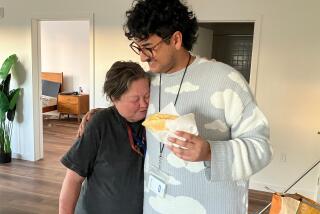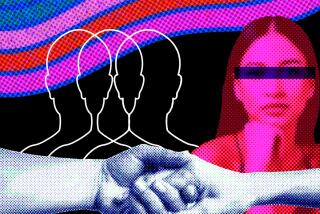Encountering Pain of the Past : Therapy: A bond of trust counteracts isolation and gives incest victims the courage to overcome denial of the trauma.
- Share via
Incest is so traumatic that its victims often bury their memory of it so deep it may take years to surface, with the scars often masked by drug or alcohol abuse, promiscuity or overeating. Finding the right therapy is an important step in healing.
“In incest, there is a tremendous denial system, tremendous suppression and repression,” said therapist Elaine Gethard, founder of the nonprofit Forte Foundation, one of many counseling agencies in the San Fernando Valley that offer help specifically to incest survivors.
“Memories of incest are often vague, more on a feeling level, because the pain, when you do remember, is horrendous,” she said.
Anita (not her real name), 40, has been in therapy for nearly 20 years, yet it was only recently that she was able to touch the childhood incest that haunted her. For years, she used drugs, alcohol, cigarettes and food to cover the pain of sexual abuse by her mother and brother.
“Finally, I wasn’t able to shove down the feelings anymore,” she said.
When her therapist recommended group counseling, she panicked. “The idea that I could talk about this in front of anyone else was impossible.”
But hearing that others had been in the same situation and survived, gave her courage. “Incest victims have an incredible feeling of being alone. Getting into a group helped change that feeling. It’s good to know you’re not alone.”
Lee Blackwell, a Ph.D. in counseling and co-director of UCLA’s Human Sexuality Program, said that besides individual therapy, there are basically two types of incest counseling--groups for incest survivors or groups for those with addiction-compulsion disorders.
Incest support groups help victims “come out of the closet” about their pain, said Blackwell, who also has a private practice in Huntington Beach.
However, he warned, “there needs to be someone who can give guidance and direction to the group, especially in a peer counseling situation, otherwise it’s easy to maintain a ‘group-victim’ status.
“For example, if someone was beaten when they spoke up at home as a child, or was put down, if the same sort of tactics are used in groups, this can be destructive,” he said.
Peer counseling is given by incest survivors who are trained to lead group counseling sessions.
Ann Britt, a North Hollywood marriage, family and child counselor, said peer counseling programs may not be for everyone. “Some of my clients were not comfortable with the group process.”
Melba Bouquet, president of the San Fernando Valley Child Abuse Council, said the training and education of the leaders and their experiences in dealing with sexual abuse issues are important considerations when looking for a group.
Bouquet, a licensed marriage, family and child counselor who runs an incest survivors group at her Northridge practice, said she advises incest victims to look at, among other things, cost; whether the service is open ended or time limited; highly structured or more of a support group.
Anita’s therapist suggested she explore several groups before picking one.
“They all feel different,” Anita explained. “You just have to trust your intuitive knowledge that you will find the right one.”
While peer counseling is lauded because of the knowledge, understanding and feeling of “having been there” that the peers bring, there are also some dangers.
“Small groups can end up re-creating the destructive patterns that brought people there in the first place,” Blackwell noted, while another therapist, who asked that her name not be used, said she worried that peer counselors “are not in enough recovery to be helpful to others. Counselors in these situations can end up doing their work in the group” instead of helping others.
“People who have been through it can identify with the client,” Bouquet said. “But someone needs to teach peer counselors how to counsel each other.”
For some, it takes courage to join a group, Gethard said, but once done, there is a great relief “that there are other people who felt the same. Groups are wonderful for the healing process.”
Gethard, whose 15-year-old, Van Nuys-based foundation does a wide array of counseling, suggested that clients make a list of questions and interview possible therapists.
“Find out what’s important to you,” she advised. “Ask, ‘Will you be there for me even if I can’t afford to pay you for a while? How will you help me? How long will it take?’ Everyone has the right to expect a direct, honest answer. If they give you a line about how you won’t understand this psychological stuff, get out.
“Never pick anyone too charismatic because it gives them too much power. If a professional encourages you to think that they alone can make you well, or can change you without your having to do anything . . . they are fostering that belief.”
Michael Buffington, co-founder of Some People’s Children incest counseling center in Encino, said, “If you go to a professional, be it a physician, licensed clinician, psychiatrist, psychotherapist” or a marriage, family and child counselor, “and you are not getting better--move on.”
Anita believes it is important to know a therapist’s background, whether or not he was abused, how long he has been in practice, how many incest victims he has treated and his experience with compulsive disorders.
“Make sure you feel a sense of trust, based on a belief that they will not be physically involved with you,” she said. “It doesn’t matter if it is male or female, as long as you feel comfortable.
“I wanted someone who did not spout any one doctrine but geared my therapy to me,” she said. “Some therapists have been raised on a certain brand of therapy, and if you don’t fit into that box, you don’t fit at all. Or they try to make you fit.”
“We see a lot of people who have been misdiagnosed,” said Buffington, noting that often the symptoms--such as substance abuse--need to be arrested before the underlying conditions emerge.
“Our peer counselors have the time and the patience and the energy to look beyond the symptoms,” he said. “They intuitively know the underlying condition.”
Gethard said that 10 years ago incest “wasn’t acknowledged,” but that “today, it’s more in the open and victims are believed more. There is denial all around, which is one reason why incest continues. A parent doesn’t want to believe that a son or husband or poker partner did this. Thirty to 40% of the women seen in our center have gone to a mother to tell, only to have the mother deny it or kick the child out.”
“There’s hope at the end,” said Anita. “That’s something nobody could have told me when I started, and that’s probably the most important thing to know.”


